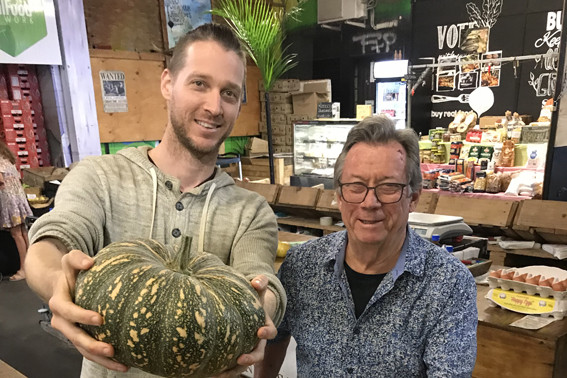General News
24 June, 2021
Let’s shorten the journey from paddock to plate
DESPITE growing in our backyard, did you know that most fruit and vegetables grown in Far North Queensland are picked early and transported a minimum of 700 kilometres round trip to Townsville, Brisbane or even further, sometimes being artificially ripened in a storage facility, before being sent back to supermarket shelves in Cairns?

It seems crazy. With the Atherton Tablelands on our doorstep, one would think it should be easy for Cairns locals to reduce our carbon footprint ‘food miles,’ and experience the best quality, fresh-picked, naturally ripened fruit and vegetables straight from the paddock to our shopping basket.
Sadly, due to bulk handling logistics and consumer demand for products ripened daily on demand, large supermarkets like Coles and Woolworths prefer to process our locally-grown produce in bulk storage and ripening facilities - with the closest ones being in Townsville.
Shopping at markets like Rusty’s in Cairns can improve your chances of getting ‘direct’ local produce, with many stallholders offering produce they’ve grown themselves, or produce they were unable to sell to major supermarkets due to cosmetic appearance.
However, there is no rule governing where market stallholders get their produce from, and many of them also sell produce which has been trucked up from facilities in Townsville or beyond.
One Rusty’s Markets vendor offering a solution is RealFood Network, a social enterprise, offering 100 per cent locally-grown and locally-transported food.
RealFood Network also offers a $50 box of produce to more than 1000 local subscribers who can choose to receive the box weekly, fortnightly, or sporadically.
Chris Gloor has been managing the project seven days a week for more than thirteen years.
Every Thursday, volunteers pack and deliver the produce boxes to local pickup host points, and Friday to Sunday, RealFood Network has a large stall near the Manager’s Office at the Grafton Street end of Rusty’s Market.
Chris said community support allowed RealFood to pay farmers a fair price, while simultaneously saving customers money.
“Farmers have traditionally been ‘price takers.’ They accept what the large retailers offer, otherwise they don’t get the contract. One of many unique aspects of our relationship with our farmers and subscribers is that we pay the farmer’s asking price and this policy is supported by our subscribers,” he said.
Chris said customers also benefited because produce was ripened longer on the vine or tree, allowing it to reach “peak flavour” and high nutrient density.
“Produce that is intended to travel far often has to be picked early, and it never reaches peak flavour, because it’s been cut off from its nutrients. With locally grown and minimally transported produce you can really taste the difference,” he said.
“The seasonal nature of our business has meant most of our customers have learned to adjust their recipes throughout the year to cook primarily with the ingredients offered in our region – rather than choosing recipes with ingredients that are out of season and have to be imported.
“Thanks to our relationship with small-scale family farms, our food boxes always contain produce that isn’t available in supermarkets, including exotic fruits like mangosteen, black sapote, heirloom varieties of fruit and vegetables, and more. People say it really helps their family to eat healthier.”
Staples like garlic, onions and tomatoes are usually available for more than six months of the year (depending on conditions), but Chris encourages customers to freeze, dry, pickle or preserve local foods for use in the times of year when they’re not in season.
RealFood Network also works with farmers to help them improve farm management practices.
Chris explained that large retailer contracts can put farmers under pressure to intensively mass-produce a single crop which requires chemical inputs such as fertilisers and pesticides, which have a negative impact on the soil and the environment.
“RealFood Network orders a wide variety of produce, giving farmers the chance to plant a diverse range of smaller crops, helping to sequester carbon and improve soil health, as well as making the farm more economically resilient if one of the crops has a bad season.
“Decentralising food distribution is also wise in the case of extreme weather events. After Cyclone Yasi, supermarket shelves went bare as the roads were cut off to the south, but all our subscribers got their RealFood box.
“It is definitely worth it to support our farmers, protect our environment and eat better in the long run.”
For more information or to order a 100 per cent locally grown RealFood box, visit www.realfoodnetwork.com.au.


